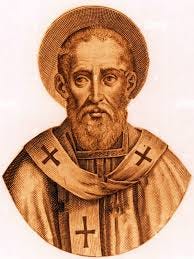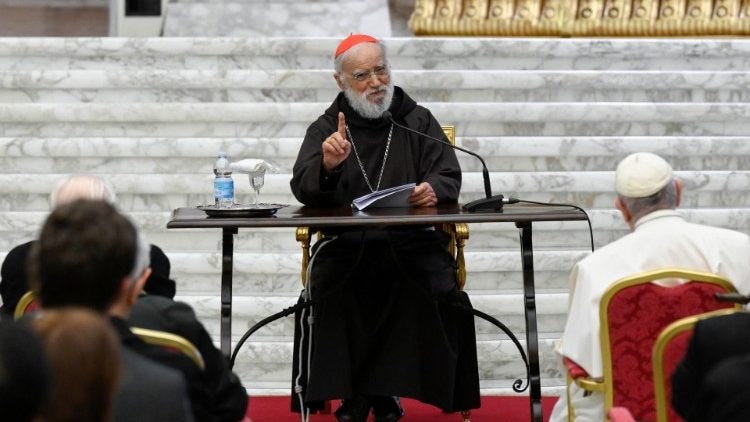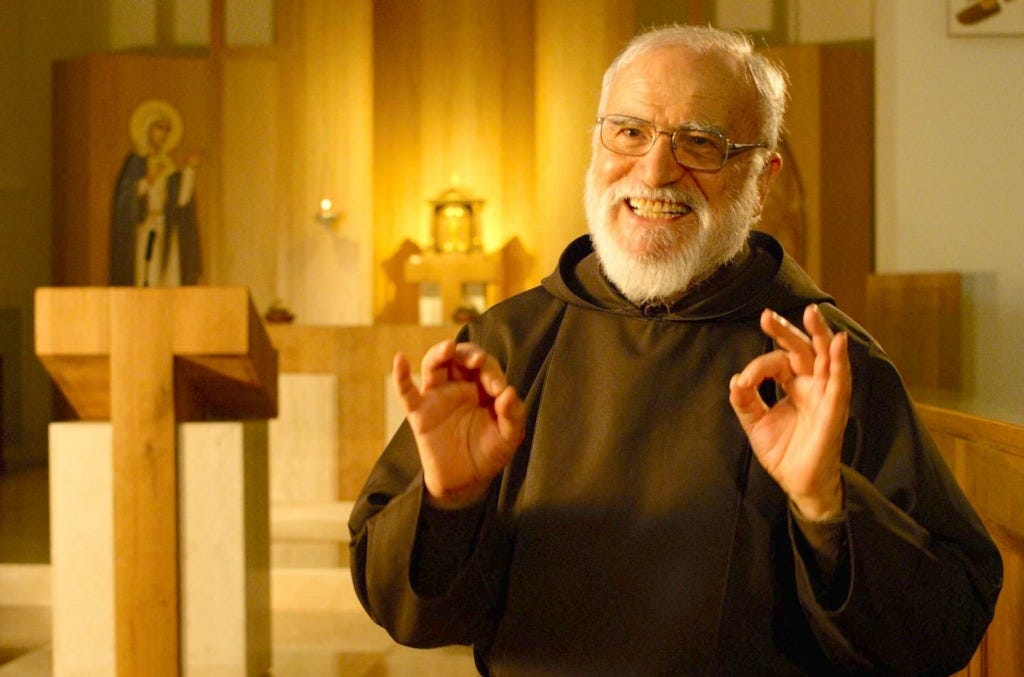The Lordship of Jesus & The Decision that Makes Morality
Morality, Article 3 - The Lordship of Christ, Cantalamessa, & a new world
Bon weekend everyone! If you haven’t subscribed to my weekly podcast, you can find it on Apple or Spotify. If you have subscribed, please leave a review! Thanks!
__
This is a continuation of the first post, below!
The Philippians Hymn (Phil. 2:5-11) culminates with the marvelous line, “…and every tongue confess, to the glory of God the Father, Jesus Christ is Lord.”
These verses from Paul’s letter to the Philippians are the basis of Christian morality because they provide the two things one needs to live the Christian life: 1) the acknowledgement and worship of Jesus as Lord and 2) the pattern of Christ’s kenosis - complete self-emptying - as the means of the total fulfillment of his identity and exaltation before God, a pattern that every Christian is asked to follow.
In every area of theology, but perhaps most especially in moral theology (because it most concretely expresses the lived experience of Christianity), Jesus is both the central figure - the object of our faith - and also the pattern for how to live that faith. Almost always, the pattern that Jesus teaches will lead us back to a single word: kenosis, which is just the fancy word for “total and utter, complete and uncompromising, radically free self-emptying.” The pattern is the Paschal Mystery: Jesus Christ has lived our life, has died our death, has risen again as the first fruits of our resurrection, and has ascended to the Father in the fulness of his humanity thus paving the way for the exultation and glorification of his whole Body, the Church.
The instruction, if you want to call it that, for following the pattern is best summed up by Jesus in his own words: “Whoever exalts himself will be humbled, and whoever humbles himself will be exalted.” (Mt. 23:12)
And Paul, because he’s wonderful, uses this early Christian hymn/formula of faith to explain to the Philippians, step by step, that the formula used by Jesus in Matthew 23 is exactly the formula underpinning the whole of His earthly life. As we saw in the last post, the chiastic structure of the hymn is a very helpful way of understanding that the exaltation of Jesus as Lord, “to the glory of God the Father,” only happened in the context of his kenosis, self-emptying.
Lord Either Way
The interesting thing is that Jesus would have been God whether he emptied himself or not, whether he “became poor although he was rich” for our sake or not. (2 Cor 8:9) The catch, of course, is that if he’d retained his equality with God without humbling himself and becoming obedient even to death, then he wouldn’t have been raised…and, as Paul also teaches, if Christ hadn’t been raised then we’d still be in our sins and our “faith is worthless.” (cf. 1 Cor. 15:17) In other words, Jesus was always going to be God whether he emptied himself or not, but his choice to empty himself and die is what makes our redemption possible.
Christos Kyrios = Risky
I’m constantly preaching about the fact that our place in Christian history, living as we do in what many are calling (and, I think, rightly) a “post-Christian” age, gives us a very unhelpful perspective of just how surprising and revolutionary the Christian ideas were in the time of the Apostles. We hear that “Jesus is Lord” and we think, “yeah duh", but the proclamation of Jesus as Lord in the first century was about as far away from “yeah duh” as possible.
The (compulsory) cry throughout the Roman Empire in the first century was “Caesar Kyrios!” - Caesar is Lord! - which, of course, was a very pleasant and exciting claim for the pagans and a deeply unsettling one for the Jews. This is one reason why, after Pentecost and the Church began her missionary work, both the Jews and the Romans found Christianity annoying at best and a huge threat at worst.
“The Sublime Knowledge of Christ”
In the cancel culture of the first century, making the claim that Jesus is Lord was really very risky, and the pressure to “be silent or be silenced” was huge. Almost every account of martyrdom from this period includes a moment of mercy(ish) from the Roman official trying to give the Christians a way out, telling them that they could go free if only they swear by Caesar and renounce Jesus. One testimony I always find moving is from St. Irenaeus’ account1 of the martyrdom of St. Polycarp of Smyra:
The Proconsul sought to persuade him to deny Christ, saying, Have respect to your old age, and other similar things, according to their custom, [such as], Swear by the fortune of Cæsar; repent, and say, Away with the Atheists. But Polycarp, gazing with a stern countenance on all the multitude of the wicked heathen then in the stadium, and waving his hand towards them, while with groans he looked up to heaven, said, Away with the Atheists.
Then, the proconsul urging him, and saying, Swear, and I will set you at liberty, reproach Christ. Polycarp declared,
Eighty and six years have I served Him, and He never did me any injury: how then can I blaspheme my King and my Savior?
“For 86 years I’ve served Jesus, and he’s never once done me harm; how could I abandon him now?” Such an iconic sentiment, and one that encapsulates the feeling and faith of the martyrs so well.
The martyrs possess perhaps the only thing that could cause them to move toward earthly death with little hesitation, and that thing of course is the knowledge (in the head and heart!) that “Jesus Christ is Lord, to the glory of God the Father.” This is what Cardinal Cantalamessa has called “the sublime knowledge of Christ.”
In the first of his 2017 Lenten sermons for the Papal Household, entitled “The Holy Spirit Leads Us into the Mystery of the Lordship of Christ”, Fr. Cantalamessa speaks at length of the charismatic movements through the Church in the 20th century, and claims (with the help of Henri de Lubac) that the spiritual reading of the Scriptures in the 20th century was quite different from that of the Fathers, which is problematic because all of our theology and pneumatology is built upon the reading of the Fathers; “what we lack,” argues de Lubac, “is that enthusiastic faith, that sense of the fullness and unity of Scriptures they had. The desire to imitate their boldness in reading the Bible today would be almost risking profanation because we are lacking the spirit from which such readings arise.”2
The great authors of the early Church spoke of the Lordship of Christ in the context of a profound spiritual encounter, a knowledge of Christ that penetrated both the mind and the heart, thus transforming the way these early Christians thought, felt, spoke, and lived. The authors of today, the Christians of today (even many theologians) attempt to present Christ outside of the Spirit’s gifts of faith and understanding, and Cantalamessa argues that this spirit-less presentation of Christ doesn’t (because how could it?) actually present Christ in his fulness; it’s impossible to present the fulness of Christ in a way anointed by the Spirit “if we do not live, in some way, that same anointing.”3
While the call to a greater experience of the Holy Spirit is an important one, Cantalamessa continues by saying that what “interests us in all of this at this point only concerns the knowledge of Christ. What understanding of Christ is emerging in this new spiritual and theological atmosphere? The most significant fact is not the discovery of new perspectives and new methodologies…but the rediscovery of a basic biblical fact: Jesus Christ is Lord!”4
The Decision that Makes Morality
It’s always been interesting to me that there are some university theology professors who will be very open about the fact that they don’t believe in God. Some European universities, having once been the center of theological teaching for the sake of the world’s redemption, are now offering courses and degrees in Christian theology as a purely historical exercise; graduate schools are examining the most complicated intellectual system in history with the spirit of a seventh grader studying the pottery of Mesopotamia.
Theological study by one who does not believe (or, better, by those who are not open to believing) is sure to be interesting, because theology is always interesting, but I have to imagine that it will feel like a waste of time once everything is said and done. Even for those of us who’ve met the Lord and know he’s our Brother sometimes wonder whether knowing the difference homoousios and homoiusios will be worth it the end, but it is precisely our desire to meet the Lord always anew that he that will make the seemingly tedious study all worth it in the end.
Anyone can, of course, just mouth those words [Jesus is Lord] without the Holy Spirit, but it would not then lead to the wonderful event we have referred to; it would not save the person. (Cantalamessa)
Cantalamessa continues his sermon emphasizing that the proclamation of the Lordship of Jesus does entail an intellectual affirmation, but at its core the proposal of Jesus Christ as Lord is a moral one. The affirmation of Jesus as Lord is not a passive moral proposal, either, but is instead a proposal that carries with it a pivotal decision. Cantalamessa in full:
From the subjective point of view…the power of this proclamation is the fact that it also entails a decision. Whoever proclaims it, is deciding the direction of his or her life. It is as if the person said, ‘You are my Lord; I submit myself to you, and I freely acknowledge you as my savior, my master, my teacher, the one who has all rights over me. I belong to you more than I belong to myself because you have bought me at a price.’ (cf. 1 Cor. 6:19-20)
Whoever proclaims that Jesus is Lord is making both an intellectual proclamation and a moral decision; whoever affirms this proposal “is deciding the direction of his or her life.”
A Lot of Pressure?
“Doesn’t that seem like a lot of pressure?” That’s the question a high school student asked me during a discussion about the power of this proclamation. Bishop Barron is famous for saying that the Church has done a lot “hand-wringing” and feeling sorry for itself in the public square because what she proposes might be too hard or “a lot of pressure.” My favorite response from Bishop Barron both as his student at Mundelein and now: “Oh, come on.” (This video is my favorite video on YouTube, by the way)
The only real answer to my student’s question about whether a single proposal that carries the power to decide the direction of one’s entire life might also bring with it a lot of pressure is (to quote myself), “yeah, duh.” We simply have got to get this through our modern minds. One of Augustine’s greatest insights is expressed in the Latin phrase Pondus Meum Amor Meus - which literally translated means “My love is my weight.” The sense of course is clear: the object of our love, whatever it is that lives at the center of our lives, will determine pretty much everything else. Pedro Arrupe’s famous poem5 about love ends with the line, “Fall in love, stay in love, and it will decide everything.”
Cardinal Cantalamessa affirms that the affirmation of Jesus as Lord does bring a lot of pressure, since when we make the affirmation it means that our entire lives must necessarily change; morally, we must be different after claiming Christ Jesus as Lord. But Cantalamessa very helpfully points out the effect this had in the early Church:
Christ died for our sins; he was raised for our justification; therefore, he is Lord. “For to this end Christ died and lived again, that he might be Lord of both the dead and the living.” (Rom. 14:9)…The proclamation “Jesus is Lord” is the seed from which the whole kerygma and subsequent Christian preaching developed.”
In other words, the sowing is great and often laborious but pales in comparison to the harvest it yields. This is why Christian testimony is so edifying, efficacious, and necessary. The plot line of every disciple’s story is “Once I was this way, and now I am this way, and the difference between the two is Him.” It is only after a person has made the decision to sow the seed of his life differently that he can expect to see discernible differences. Cardinal Cantalamessa is speaking to theologians and preachers here, but his words apply to all of us:
“Only after a theologian or preacher has decided to gamble everything on Jesus Christ, the ‘only Lord’ … only then does that person experience a new certainty and power in his or her life.”
So, yes, one could say there is a lot of “pressure” there, but as with everything in the Christian life it’s really only pressure if you view Jesus your Brother as an added burden to your life or as an imposition on your freedom. Over time with him, he teaches us that what he said is true: his burden really is light, and his truth really will set us free. The joy that comes from this way of life is only possible in it all its fulness when the intellectual affirmation of Jesus as Lord is paired with our own lived kenosis, self-emptying, to such a degree as to be able to say with Paul that it’s Christ’s very life being within us. (cf. Galatians 2 and Colossians 3)
“The Lordship of Christ is a new world.”
(Cantalamessa)
Conclusion
The affirmation of Jesus Christ as Lord, to the Glory of God the Father, is the decision that makes morality. The Christian moral life makes zero intellectual sense and has zero appeal in daily life unless the person trying to live the Christian moral life actually believes and affirms that Jesus is Lord; we must learn to say to Jesus (in the words of Cardinal Cantalamessa quoted above): “You are my Lord; I submit myself to you, and I freely acknowledge you as my savior, my master, my teacher, the one who has all rights over me.”
That prayer flies in the face of everything that the modern consciousness of self-fulfillment proposes, as we will soon see with the help of the philosopher Charles Taylor.
Coming up next, though…we’ll turn to Fr. Giussani and a discussion of the formation of a Christian personality and the role of memory and desire in morality.
https://www.ofmcap.org/images/docs/cantalamessa/quaresima_2017/raniero_cantalamessa_en.pdf. Also see Henri de Lubac, Medieval Exegesis: The Four Senses of Scripture, vol. 2, trans. E.M. Macierowski (Grand Rapids: Eerdmans, 2000), p. 63.







